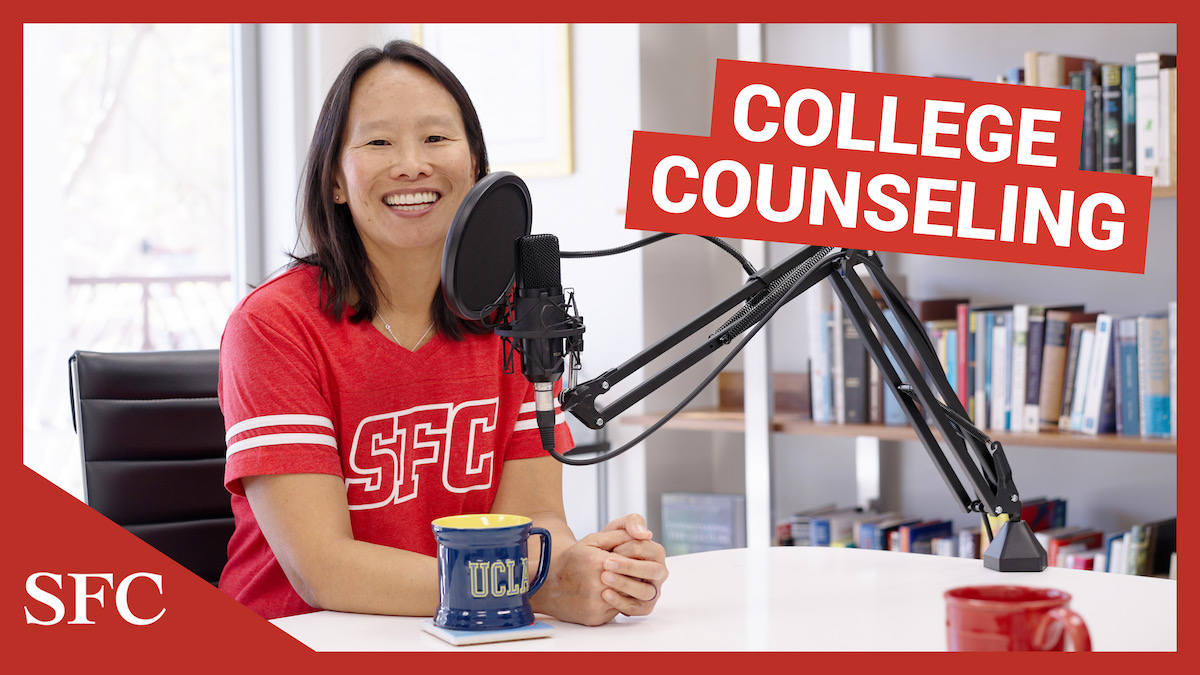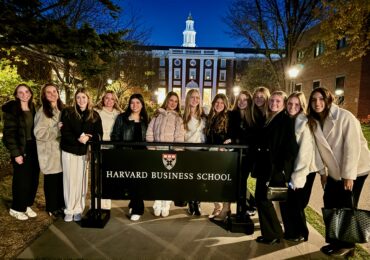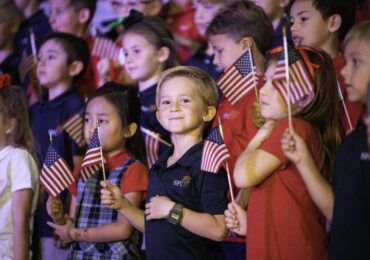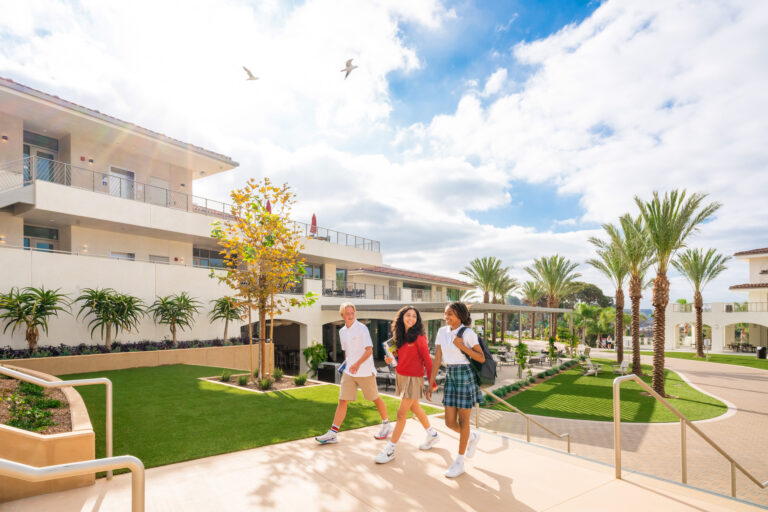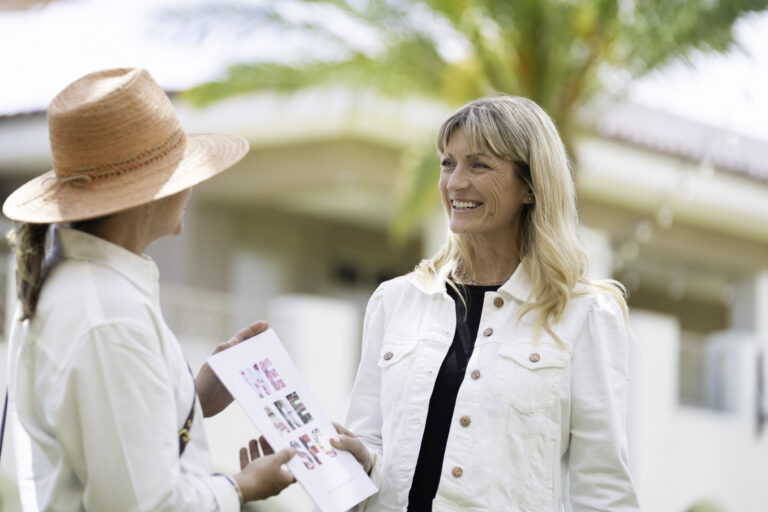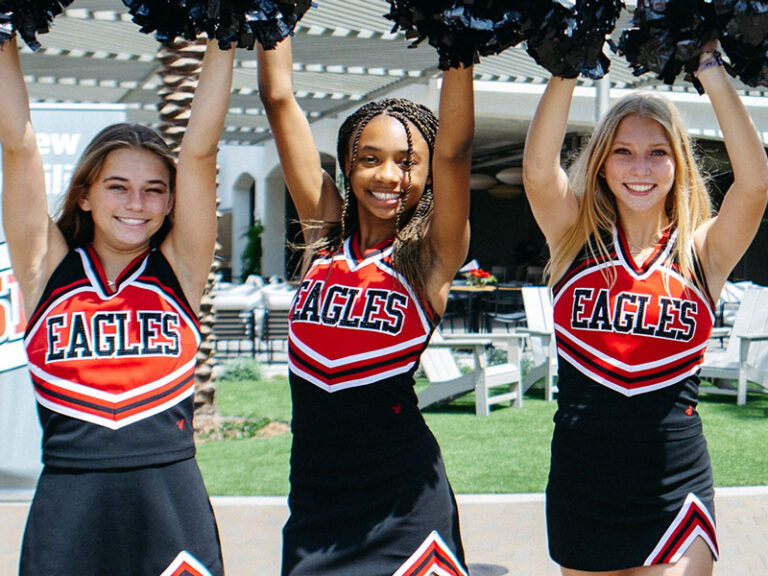Episode Show Notes
In this episode, Mike sits down with High School Academic Counselor Nancy Olah for a great conversation on all things college and getting students prepared to shine come application season! Get ready for some helpful tips for each grade level starting in 8th grade!
Mike Siciliano, High School Dean of Students, has a long history with Sante Fe Christian, sitting in several roles including alumnus, US history teacher, and football coach. As a student, Siciliano felt he had teachers and coaches who personally invested in him and made a huge difference in his life. Now, he tries every day to continue that legacy for current SFC students, live up to the standard his teachers set for him, and have a lot of fun.
Nancy Olah, High School Academic Counselor, started working in Christian education in 1995. Her desire is to make a positive impact on high school students. She encourages her students to see the unique, God-given gifts and talents they each possess and to make educational decisions that are right for them. Nancy advises her students by connecting them with courses and opportunities that align with their interests. Nancy and her husband Andy have been married for over 25 years and are blessed to have two children; an SFC graduate and a current upper school student.
Highlights
00:01:21 – Introductions
00:01:36 – Description of counseling department
00:03:27 – Why Nancy moved to counseling and has stayed with it so long
00:04:32 – What has changed about the college admissions process during the last 20 years
00:07:21 – How students are counseled which schools to apply for
00:09:09 – How students are advised to relieve pressure regarding college application process while positioning themselves in the best way possible
00:11:41 – How counselors help students broaden their view of colleges available
00:13:40 – Description of meeting with eighth graders or ninth graders
00:17:21 – How the pandemic has changed testing
00:20:33 – Advice for parents in terms of college admissions and what they can do to help their students over the next four years
Transcript
Mike Siciliano [00:00:00] Welcome back to another episode of our Eagle Perspective Podcast. I’m Mike Siciliano, and I am joined today by one of our High School academic counselors, Miss Nancy Olah. Nancy, thanks for being here.
Nancy Olah [00:00:17] Thank you, Mike. Honor to be here and to speak on behalf of our department.
Mike Siciliano [00:00:23] Well, a couple things. We’re going to talk all things college and college counseling today. I noticed you brought a mug that says UCLA on it, which, as a USC person, I find personally disappointing. Nobody gave me a heads-up about this. Well, what is it about that mug that you’re drawn to?
Nancy Olah [00:00:41] Well, UCLA is actually my alma mater. My husband and I have a mixed marriage. He went to USC; I went to UCLA, but love is blind, and we’re united in Christ. There you go.
Mike Siciliano [00:00:53] Since I wasn’t given the opportunity to bring my USC mug, I did at least find some red.
Nancy Olah [00:01:02] Oh, very nice.
Mike Siciliano [00:01:03] I feel like we should at least balance the table a little bit for our viewers out there.
Nancy Olah [00:01:07] There you go. I love my USC friends.
Mike Siciliano [00:01:09] The same for UCLA. It’s an amazing institution. Friendly rivalry, of course. Why don’t you tell us a little about how long you’ve been at Santa Fe and what you do here?
Nancy Olah [00:01:19] This is my 14th year at Santa Fe. Previously I was at a private school up in West Los Angeles. God opened a door for us to come here. It’s just been a great journey so far. This is a wonderful place. Love being a college counselor here.
Mike Siciliano [00:01:36] You are the one here, but you are one of three that we have. Tell us a little bit about the counseling department at Santa Fe and what else it looks like.
Nancy Olah [00:01:43] Our counseling department, I believe, is one of the best in San Diego County, if I do say so myself. We have three full-time academic counselors. We divide the alpha split into thirds. We all have our own group of students that we work with one-on-one, but students and parents are free to just ask any of us for general questions, like testing. If they have a question about testing, all three of us would say the same thing and provide the same answers. What’s nice about our model is that students and parents have a devoted counselor to go to talk to about their student’s unique needs. It might seem like, “Oh, wow, you have such a great caseload,” and we do. We are so blessed. Some of our colleagues in the public schools are just overwhelmed. They’re dealing with crises, and they can’t really devote time to good students who are just doing well.
Mike Siciliano [00:02:45] Just to put some numbers to that, our classes on the big end are maybe 120 with 3 full time-counselors. We’re talking in an average senior class, you have about 40 students, which is a really small number.
Nancy Olah [00:02:57] It’s great, because then we can really get to know students. If students say, “Hey, I really want to do something creative and maybe do something a little bit out of the ordinary,” then it gives us the opportunity to work with that student one-on-one on those things.
Mike Siciliano [00:03:13] Awesome. You’ve been a college counselor here now for what, 12, 13 years?
Nancy Olah [00:03:17] No, fourteen years.
Mike Siciliano [00:03:18] But that has not been the entirety of your experience in education. I think you were actually a principal. Am I saying that properly?
Nancy Olah [00:03:26] I was.
Mike Siciliano [00:03:27] You’ve had a number of jobs in the field of education. What made you pivot to counseling and, obviously, stick with it?
Nancy Olah [00:03:34] I started off as a teacher in the classroom. For the last couple of years at my previous school I was in administration. Throughout my time in education in Los Angeles I wore a lot of different hats. I find the role of an academic counselor to be the most rewarding. I get to work with students and families one-on-one. I get to be a lifelong learner, which I really love. I get to travel. This weekend I’m going to a university that invited me to be part of a counselor fly-in program. I get to learn all about that school and come back and share about it with our students. To me, it’s the best of both worlds. I get to be a little bit of a teacher, a little bit of an administrator, and certainly, a lifelong learner.
Mike Siciliano [00:04:19] I’m a little jealous, because I don’t really get to do much traveling in my role. What you’re telling me is if I want to see the world, I need to move on over to the counseling center.
Nancy Olah [00:04:28] I think I have the best job on campus.
Mike Siciliano [00:04:32] Let’s talk a little bit about college in general. We’ll get to our process and specifically what you do with students, and at what age, and what that looks like, but I want to start with a broad question. I’ll date myself a little bit. I graduated from high school 20 years ago. I can’t believe it’s true, but it’s true. What has changed about the college admissions process between then and now?
Nancy Olah [00:04:58] I would say quite a lot has changed, but yet at the essence, the core is still the same. What I mean with that is colleges are still looking for academically motivated students, students who want to challenge themselves in the classroom as well as engage in their community and just be great roommates. That hasn’t changed. What has changed are the vehicles and the modes in which students can apply to schools. Because of that, because of technology changing… I’m going to date myself, too. When I applied to UCLA, I rolled my application into a typewriter and filled it out that way.
Mike Siciliano [00:05:42] But that’s only because you were into antiques. That was more of a hobby.
Nancy Olah [00:05:46] That’s right. But now with things like the Common App and with the UC application being available electronically, students can apply to 20 schools using the Common App, all nine using the UC application. Because of that, it makes the process a little bit more selective. Oftentimes I hear parents saying, “Oh, my gosh. Back in my day, everyone got into San Diego State.” That might have been true, but nowadays it has definitely become more selective of a school, just because technology has changed, the number of applications colleges receive, and internationally, too. Our educational system is the envy of the world.
Mike Siciliano [00:06:29] Just to put a fine point on that, when I was applying, the Common App wasn’t really a thing. Most of the schools, or a lot of schools, anyway, weren’t a part of that. What’s happened since is that now most of the schools are a part of the Common App. If you’re applying, it really becomes a matter of just how many boxes you check and whether you want to pay the application fee for those schools. Suddenly, you can apply to 25 schools by checking that box.
Nancy Olah [00:06:58] Well, over 900 schools are on the Common App. The Common App limits it to 20.
Mike Siciliano [00:07:04] You can apply to 20 schools on the Common App?
Nancy Olah [00:07:07] Right. Theoretically, yes, that is possible. We strongly advise against it.
Mike Siciliano [00:07:13] Sure. But that has led to more applicants applying to more schools and, therefore, more competitiveness in the process.
Nancy Olah [00:07:19] Absolutely.
Mike Siciliano [00:07:21] How do you counsel students as far as where should you apply?
Nancy Olah [00:07:27] Can I talk a little bit about how unique Santa Fe approaches the…?
Mike Siciliano [00:07:33] I would love nothing more than for you to talk about that.
Nancy Olah [00:07:37] I think what I love about Santa Fe Christian more than any of the other schools that I’ve come across and on a lot of these counselor fly-in programs and through our professional association… I don’t know if everyone knows, but Steve Strimple, Jeralyn Johns, and I are members of the National Association of College Admissions Counselors. We’re very active in our national and regional organizations. As a result, we get to talk to a lot of college admissions officers and a lot of other counselors from other high schools, private schools, all around the country. Again, part of why I think my job is the best job in the world. But I digress there.
Mike Siciliano [00:08:19] I’m feeling very insecure suddenly, Nancy. I’m in the wrong field here.
Nancy Olah [00:08:23] What I like about our model is we get to start working with students from a young age. I think that’s the benefit of our K-12 approach. We get to know students in the spring of their eighth-grade year, and we get to work with them throughout their time in high school. I joke with my students and parents—we get to stalk you all throughout high school, not in a creepy way. We really want to get to know our students, and we want to expose them to a lot of different opportunities, and get them to look at more than just the name of the school. We want them to know why is it a good fit for them, and why God is calling them to that school, and is it a place where they can really utilize the gifts and the talents that God gave them.
Mike Siciliano [00:09:09] I want to pick up on that before we get more into some specifics and some details, because I know in my role I see a lot of students who are really stressed about the college process. It feels like the pressure has ratcheted up; all the things you’re supposed to do has ratcheted up. It’s so competitive now. There are more schools where it just feels like a roll of the dice. How do you help students balance that college pressure and stress? Also, at the same time, you want them to be doing the things that they can do to put themselves in the best position.
Nancy Olah [00:09:45] I think one of the things that I love about Santa Fe are all the opportunities our students have. We had the opportunity this morning to sit with our Blue and Gold officer for the naval academy. He was talking about qualities like leadership and athletics, extracurricular activities, academic rigor. Those are all the things Santa Fe offers. I know personally from my daughter’s experience when she graduated in 2019, she was able to play sports, be in the musical as well as take AP courses, and pursue her dream of becoming an artist and a graphic designer. All of that really helps make applying to college pretty…not easy, but when they’re filling out their applications, they have a lot to be able to write about and add to the résumé. As far as our role goes, Steve Strimple has been here a little bit longer than I have, and he’s really very insightful about crafting the college list and how it comes down to having a healthy, well-balanced list. I tell some students, “You’re playing it too safe. Maybe you should add a reach school.” Every healthy college list should have safety or target and then range schools as well as reach schools. Sometimes I’ll have students say, “Hey, I really want to go to XYZ University.” I’m like, “Gosh, that school has less than a 4% acceptance rate.” Honestly, it’s not my role to say whether or not that student is going to get in or not get in. I’m not the admissions officer. If God’s put it on their heart, then he’s put it on their heart for a reason. It may be because he has a plan for them that leads them there, but it could also be because he has a plan for them that maybe that door closes, but then something else opens as they pursue that school.
Mike Siciliano [00:11:41] I know from experience it’s pretty tough to convince a 15-, 16-, 17-year-old that maybe that’s the case. How much of it is helping them see that there is a wide range of schools out there beyond just the eight Ivy League schools or the top UC schools? What do you do to help broaden their eyes to the amount of awesome places out there?
Nancy Olah [00:12:04] Early on we get our students… Well, a couple of things. All of our ninth graders have the opportunity to sit for the PSAT in the fall. When they take the PSAT, then they are on the radar of College Board and the students search service. They’ll start getting emails from colleges. That’s one way for them to start getting to know different schools. The second is we start working with them on something called Naviance . This is a program that they’re going to use throughout their time at Santa Fe. There are other programs similar to Naviance, but for now that’s what we’re using. It starts with ninth grade, doing their personality profile for them to really know themselves. Their personality is really an eye-opener for them sometimes. We also have them do a learning style inventory so they can see what types of environments they learn best in. Then in the sophomore year… Oh, and that also leads to a careers exploration. When they look at careers, it also then suggests colleges that have majors that lead to those careers. It’s multifaceted. We don’t want to start hammering college, college, college from an early age, because it shouldn’t be about college; it should be about you finding your potential here at Santa Fe, getting involved in things, building a community. The college admissions is going to be a byproduct of that.
Mike Siciliano [00:13:40] I love that so much. I know one of the things that you’ve said, too, is there’s a school out there for everybody. It’s just a matter of understanding who you are, how God made you, and where you best fit. I love when I get to overhear you having that conversation with students. But you mentioned it doesn’t have to be about college per se from the beginning. That’s a good segue to you start with eighth-graders, the spring of their eighth-grade year or, if they’re going to be new to our school, maybe summertime before they are admitted in ninth grade or before they start ninth grade. What does that meeting look like? What does the beginning look like for an eighth-grader or even a ninth grader?
Nancy Olah [00:14:19] I love meeting with our incoming freshmen. We talk about their four-year plan. That goes over all of our graduation requirements that are designed to position them for college admission as a college prep school, but it also helps us to get to know their interests. Maybe they’re really exploring or searching, and maybe they might have multiple interests. I love working with students who have multiple interests. There are colleges where they can fully explore all of those interests as well as colleges where if a student says, “I want to be an engineer,” then that’s what they’re going to study exclusively. I love getting to know them, what they’re involved in, what they’re interested in. As a department, we keep a robust list of enrichment programs so if a student says, “Hey, I’m really into music, and I want to be part of the band,” helping them craft that schedule, what that four-year plan looks like to make sure band is part of it throughout their time at Santa Fe, and then also getting them connected with college programs, some great programs through very selective schools where they can then cultivate that musical talent outside of Santa Fe.
Mike Siciliano [00:15:34] As you go through the years, one thing I think that’s really neat that maybe is underappreciated—they can come see you anytime. Your office is 20 feet from my office. They can walk in, and sit down, and have a conversation and say, “I’ve changed my mind about absolutely everything,” or say…
Nancy Olah [00:15:55] Sometimes seniors come in and say that.
Mike Siciliano [00:15:57] That’s got to be fun.
Nancy Olah [00:15:59] Yes.
Mike Siciliano [00:16:00] But it happens. How do we accept…? We can’t really expect a 14-, 15-year-old to have their life all mapped out, or even an 18-year-old. For you, you become their ally, their confidant, their advisor over the course of those four years.
Nancy Olah [00:16:19] We love working with students, and we have an open-door policy to our students. Naturally, we work in cycles. Sometimes the fall is very much devoted to the seniors in the application cycle, and then we transition to our juniors to get them ready for their upcoming application process. For our freshmen and our sophomores, we meet with them at least once a year. We do a grade level event for every grade’s parents just to keep them informed on what they can be doing to help their students as they proceed through each grade. After we meet with the freshmen, we’re like, “Hey, this is our time. Please.” We give them a link to schedule a meeting with us. We encourage them to sit down with us and talk about their summer plans, their ideas for next year’s courses, and what their interests are. We go over their Naviance, their personality assessment, or their learning profile and talk about it, too. It’s all really great stuff.
Mike Siciliano [00:17:21] How has the pandemic changed things a bit? I know one hot topic that I get questions about is the SAT or ACT, and all the testing, and schools going test-optional. I know that’s not all real settled yet. How are we navigating that?
Nancy Olah [00:17:35] I’m so thankful and grateful for the network of college admissions counselors that we’ve built up over the years. When COVID hit, I had seniors who had their tests rescheduled on them four or five times, and they could not take a test. That first year, colleges were pretty much forced to go test-optional or test blind. Students who had test scores and felt like they accurately reflected their potential as a student were able to submit them and have them considered, and students who didn’t have the opportunity to sit for a test or maybe sat for it really early on just as a practice test didn’t want to submit those scores. That’s been a little bit of a moving target. Now as we’re entering year two and then going into the third cycle of students applying into college, things are shifting a little bit. One of the blessings of the pandemic is colleges realized maybe test scores don’t really adequately reflect how a student’s going to do at our school, maybe it’s something we can release and make optional. The UCs have gone test blind, and the Cal States are probably going to go that way. At least, that’s the proposal before their academic senate. We’re still waiting to hear from some other schools. But now it’s gradually becoming a little bit of a mix. We’re just trying to see what colleges are doing. Going to these conferences is important, mingling with our college admissions reps, and just reaching out to them like, “Hey, do you guys have a plan for fall 2023 grads or undergraduates?” Right now we’re still in that in-between stage, where we’re waiting to see. Most colleges that have gone test-optional are going to stick with it. Some schools, it is starting to come back, and maybe it’s a factor in their scholarships. We are encouraging students to sit and prepare for a test. It’s better to do more and need less than to say, “Oh, shoot. I should have done this,” later on when it’s too late.
Mike Siciliano [00:19:53] Too early to say, “Hey, don’t worry about tests; don’t take it.” There’s still potentially some benefit to doing that. Here’s another question. It’s a really important one. Are you ready?
Nancy Olah [00:20:04] Sure.
Mike Siciliano [00:20:05] What percentage of university mascots, if I named the university, would you get correct?
Nancy Olah [00:20:11] Oh, my gosh.
Mike Siciliano [00:20:13] I know. I see all the pennants in your office. There’s some in there that I’m like, “I didn’t know that was a school.”
Nancy Olah [00:20:19] Yes. I’m not quite sure. I will tell you that there are some college mascots that I’m just like, “Ooh, I don’t know if I would have chosen that as a mascot.”
Mike Siciliano [00:20:28] Like, for example, Long Beach State. Do you know what they are?
Nancy Olah [00:20:31] Good question. I’m not quite sure.
Mike Siciliano [00:20:33] I think they’re the Dirtbags. I think that is their mascot. I’d put that in their catalog. Here’s a question for you. Let’s say I’m a parent who has an eighth-grader who’s about to get into high school. What advice would you have for that parent in terms of college admissions and what they can do to help their student over the next four years?
Nancy Olah [00:20:58] That’s a great question. My biggest piece of advice would be to encourage your student to get to know their counselor. I can think of students right now that when they were young just stopped by my office and said, “Hi, I’m so-and-so. I’m going into high school, and I’m really excited about it. When can we meet?” It’s like, “Oh, my gosh, I love the initiative.” Those are things that we can actually write about as we write their letters of recommendation, too. “Wow, this student had so much initiative. They came and met with me on their own volition.” Maybe it was a little bit of encouragement from their parents, but it takes a lot of maturity, a little bit of courage to just approach an adult and introduce themselves, and for that student to really get to know their counselor. I would say that’s the biggest encouragement. Like I said, all of our students have our appointment link. We share it with them as well as their parents. We’ve said, “Please schedule a meeting with us.” Sometimes I’ll chase a student or two down like, “Hey, do you remember you wanted to meet with me?”
Mike Siciliano [00:22:11] It’s the same in the academic side from classes. One of the nice things about being here is we notice when you stop showing up or when you don’t. We notice. It’s nice to be able to redirect that way when needed.
Nancy Olah [00:22:26] Another thing that I really love about our model of meeting with students early is we get to know them and follow them throughout their four years here. In the fall of their senior year, we write letters of recommendation. Actually, we start writing those letters over the summer leading into their senior year. We get to advocate on the behalf of every one of our seniors. That is a huge privilege. I feel like I get to almost tell God’s story on how he’s worked in their lives over the last four years. That’s a lot of fun. I also have a bit of a background in journalism. So, it’s nice to get my writing fix in that way. That’s great. That’s a huge plus of our school. At some schools, especially in the public schools, a lot of counselors, there’s a box on the secondary school report form where they can just check I don’t know the student well enough to provide a letter. It certainly doesn’t hurt a student at the public schools, but it doesn’t really help them, either. To have that additional voice to advocate for a student is really helpful. I would say, too, when it comes to forming a student’s list, we really encourage students maybe not to hold onto one or two things too tightly, because we want them to leave room for God to work in their life. If you are holding onto things so that your fists are closed, you don’t allow him to bless you with opportunities that you’re not even aware of yet. Sometimes teenagers see things very black-and-white. That’s where we come in and say, “Hey, have you heard about this school?” and, “Did you know about that program?” and, “I really see this as a good fit for you.” I’ve had students and parents come back and thank me. So have parents and students—thanking Steve and Jeralyn—just for recommending schools that they didn’t consider before that they ended up at, and it turned out to be the best thing.
Mike Siciliano [00:24:44] Awesome. Well, Nancy, we are very blessed to have you as well as Steve and Jeralyn. I know having now seen a few cycles of kids come in as freshmen and leave as seniors that you’ve been a huge asset to them, and your department has been amazing at guiding them through what can be a really stressful time. Thank you for the work that you do here, even though you went to UCLA. I think you’ve overcome that particular barrier.
Nancy Olah [00:25:09] I will say love is blind. No, I thank admin for all their support, as well. We couldn’t do what we do without having a supportive administrative team. Thank you.
Mike Siciliano [00:25:20] Well, thanks again for sharing. Thank you all for listening today to another episode of our Eagle Perspective Podcast. If this is your first one, you can check us out on Spotify, Apple Music, or other places where podcasts are available. You can also watch our video podcasts on YouTube. We will see you again next time.
